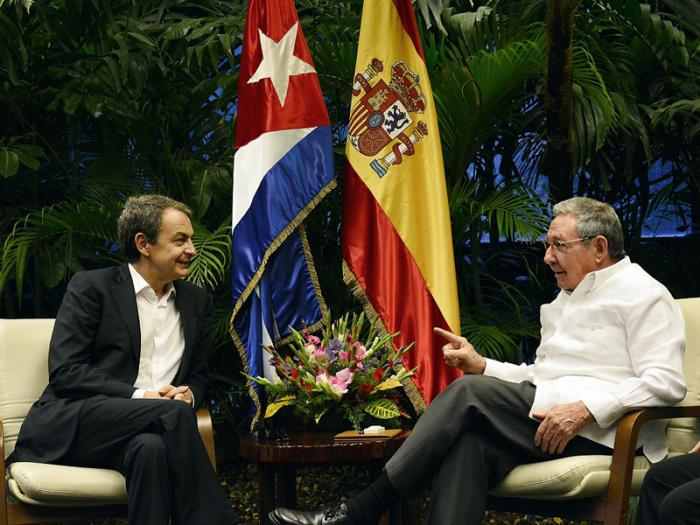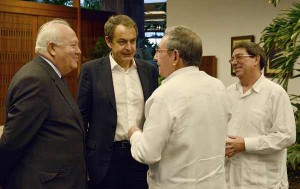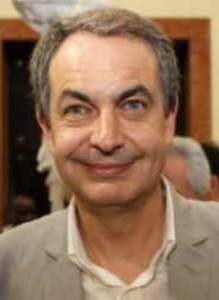
Spanish chancellor angered by former socialist leaders’ trip to Cuba
The arrival in Cuba of former Spanish Prime Minister José Luis Rodríguez Zapatero (2004-2011) and former Foreign Minister Miguel Angel Moratinos Cuyabé (2004-2010) has raised hackles in Madrid.
Spanish Foreign Minister José Manuel García Margallo stated publicly that the trip is “an extraordinary disloyalty in the management of foreign policy and an example of importunity.”

He also said that “at no time” had he been informed of the two former officials’ plans. The gist of his displeasure is that the two former officials, both socialists, do not represent the views of the right-wing Popular Party government of Spain.
The two former officials’ trip was made public by the Cuban daily Granma, which stated Thursday (Feb. 26) that Zapatero had “a cordial meeting” with President Raúl Castro, during which they discussed “topics of mutual interest in the regional and international agenda, as well as the historic relations that bind both nations.”
Earlier, Zapatero met with Cuban Foreign Minister Bruno Rodríguez Parrilla and the interim minister of Foreign Trade and Investment, Antonio Carricarte Corona, Granma reported.
Zapatero’s and Moratino’s trip is an “enormous anomaly,” Margallo said, and the fact that Zapatero met with the Cuban president “has never happened in other instances, including autonomous governments that, despite having important discrepancies on foreign policy, have always respected the duty of loyalty and respect for the national interests defended by Spain.”
“Autonomous governments” is an allusion to Spain’s autonomous communities of Catalonia, Galicia, and the Basque Country.
Surmising that the two former officials’ trip has to do with the ongoing talks on normalization between the European Union and Cuba, Margallo said that he will speak personally with the EU’s foreign policy representative, Federica Mogherini, and tell her that any opinions that Zapatero and Moratinos may have expressed to Castro and his government, “which we know nothing about, were made without the knowledge of the Spanish government and in no way represent the position of the Spanish government.”

Margallo’s displeasure may also be related to the fact that, when he visited Cuba in late November 2014, he was not invited to meet with President Castro.
“At no time were we informed which meetings [Zapatero and Moratinos] would hold, the political authorities they would visit, the messages they might transmit,” Margallo told the press. Nor was the Spanish Foreign Ministry consulted about “messages that the Spanish government considered opportune for two persons visiting Cuba to convey, which is what really matters.”
Margallo said that he was not so much interested in travel itineraries but “in who they’re going to see, why they’re going there, what they’re going to say and for what purpose, and if that helps the better development of Spanish policy or not.”
“In civilized countries, the opposition and the government play different roles, but everyone knows what part they must play,” he said. “In this case, I don’t know what the script is, I don’t know the purpose of this visit.”
This is the first time that Zapatero has visited Cuba. Moratinos traveled to Cuba four times previously. Zapatero is expected to give a press conference later on Thursday.
UPDATE: Moratinos says chat with Raúl was unexpected

Former Spanish Foreign Minister Miguel Ángel Moratinos on Thursday phoned the current Chancellor, José Manuel García Margallo, to explain why he and former Prime Minister José Luis Rodríguez Zapatero met with President Raúl Castro while in Havana.
“We didn’t know that we were going to meet with Castro. That didn’t even appear on our schedule,” Moratinos told the Spanish newspaper El Periódico.
“What happened was that Castro wanted to see us because of the important role that Zapatero and I had in the process of aperture,” Moratinos said, referring to the talks on normalization of relations between the European Union and Cuba.
According to El Periódico, Zapatero and Moratinos are in Cuba as representatives of an international organization that advocates the abolition of capital punishment worldwide. Cuban law contemplates capital punishment but has not carried out executions in a long time.
Moratinos said that his conversation with Margallo was “quite proper” and that the “misunderstanding” was clarified to everyone’s satisfaction.
At a press conference in Havana Thursday afternoon, Zapatero said that he would not comment on Margallo’s criticism of him and added that he will report to Margallo on the Cuban trip upon his return to Madrid.
[Shown in photo above is former Spanish Prime Minister José Luis Rodríguez Zapatero meeting with Cuban President Raúl Castro.]


